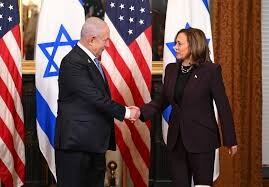Harris will follow Biden policy on Palestine if elected president

MADRID - President Biden withdrew from the presidential race on July 21 and endorsed Vice President Kamala Harris as the new leader of the Democratic Party. This announcement ended weeks of uncertainty among party leaders, who had urged him to exit the race following a poor performance in last month's debate. Many Democrats feared that Biden, due to his age, might not be able to defeat former President Trump.
In his initial statement, Biden did not explicitly endorse Harris but later expressed his support in a post on X (formerly known as Twitter). "My first decision as a party candidate in 2020 was to choose Kamala Harris as my vice president. And it has been the best decision I have made. Today, I want to offer my full support for Kamala to be our party’s candidate this year. Democrats, it’s time to unite and beat Trump. Let’s do it!” Biden wrote.
Harris is poised to become the Democratic presidential candidate after securing the support of approximately 2,668 delegates, according to an Associated Press count. This number far exceeds the 1,976 required for the party nomination.
Jamie Harrison, Chair of the Democratic National Committee, assured reporters that the party will designate the presidential candidate by August 7 and is committed to an “open and fair” nomination process.
Kamala Devi Harris was born in Oakland, California, on October 20, 1964. She is the daughter of a Jamaican father who emigrated to the U.S. to study economics at the University of California, Berkeley, and a mother who emigrated from southern India to the U.S. in the late 1950s. Her mother earned a Ph.D. in nutrition and endocrinology from Berkeley.
Harris became the District Attorney of San Francisco in 2004. In 2011, she assumed the role of Attorney General of California, responsible for law enforcement in the state. She held that position until 2017 when she was elected as a Senator from California.
From a political perspective, Harris’s candidacy represents a continuation of Biden’s presidency and will face the same challenges as the current administration. Analysts predict that, if elected, Harris will largely continue Biden's approach to the Gaza conflict, reaffirming support for Israel’s security and right to “self-defense” both before and after the Hamas attacks on October 7.
In 2017, Harris spoke at the annual conference of the pro-Zionist lobby group AIPAC, where she reaffirmed her strong support for Israel. She promised to uphold Israel's right to self-defense and to strengthen military cooperation between the two countries.
Since the onset of the Gaza genocide, Kamala Harris has maintained the stance she expressed at the AIPAC conference. In her speech at the Munich Security Conference in early 2024, she reiterated the United States' commitment to Israel's security and its right to self-defense, while demanding the immediate release of Israeli hostages held in Gaza by Hamas.
In Munich, Harris emphasized the administration's stance on combating "Iranian aggression and its allies, preventing regional escalation, and promoting regional integration," an approach that has been a hallmark of Biden’s foreign policy, which sought to secure a normalization agreement between Saudi Arabia and Israel.
Although Harris has made statements regarding a “ceasefire” in Gaza and has repeatedly spoken about the “humanitarian crisis,” she has not focused on the Zionist colonial occupation as the primary cause of this crisis. The notion, promoted by some media close to the Democratic Party, such as the NYT, that Harris might alter the Biden administration's policy toward Palestine if elected president does not withstand rigorous analysis.
As Halie Soifer, who served as Harris's national security advisor when she was a senator, noted in an article for Politico: “She and President Biden are in complete alignment regarding Israel. There is no difference between them.”
In this regard, it is not only Kamala Harris who will continue the same policy toward Palestine as Joe Biden; the United States has consistently supported the colonial and military occupation of Palestine since Israel's founding in 1948, with the possible exception of the Suez Crisis in 1957.
For decades, both Democratic and Republican U.S. administrations have unconditionally backed the Zionist occupation. President Harry S. Truman supported the partition of Palestine in 1947 and immediately recognized Israel in 1948.
Following the Six-Day War in 1967, the United States realized it could use Israel to exercise indirect control over the region. The “special relationship” between the United States and Israel, a term first used by President John F. Kennedy, is based on the annual provision of substantial financial aid to Israel. In return, Washington gained what has effectively become a U.S. military outpost in what American military strategists consider the most important region in the world.
It is anticipated that this “special relationship” between the United States and Israel will remain unchanged in the future, whether Trump or Harris wins. In either case, Palestinians will continue to be subjected to occupation and daily, persistent violence. This violence, driven by the colonial objective of eliminating the physical and political presence of the native Palestinian society, has received and continues to receive American support. The United States, regardless of the political party in power, is crucial in sustaining the occupation of Palestine.
Leave a Comment